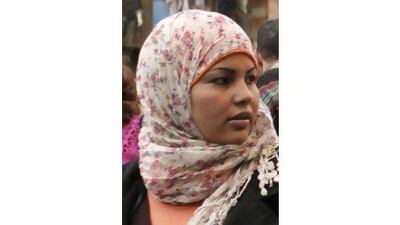CAIRO // A military court yesterday dismissed charges against an army doctor accused of forcing a woman to have a virginity test in a military prison after a protest last year.
The case has been a rallying cry for critics of the Supreme Council of the Armed Forces (Scaf), the generals ruling Egypt, because it appeared to confirm fears the military would use the same brutal tactics it had used during the Hosni Mubarak regime.
Mena, the Egyptian official news agency, said charges against the doctor, Ahmed Adel El Mogy, were dropped because of conflicting testimony from witnesses for the woman involved.
The judge said his decision came "from what has been proven in documents and based on my conscience", according to Mena. He said he had "not been subjected to any pressures".
The case cannot be appealed.
Samira Ibrahim, 25, the woman from the Upper Egypt city of Sohag who filed the case, emerged from the court in tears yesterday. She later struck a defiant stance on the social networking website Twitter, vowing to fight on.
"Nobody violated my honour. It's Egypt whose honour was violated. And I will go on 'till the end to get her rights," she wrote.
Ms Ibrahim recounted in an interview with The National this year that after being arrested among a group of protesters last March, she was taken to Hikestep military prison.
She was brought to a room for what she thought was going to be a routine search of her possessions but a woman instead told her to strip.
She said Mr El Mogy then examined her for five minutes, while her naked body was exposed within view of soldiers watching at the door.
He determined she was a "girl", meaning still a virgin, and demanded she sign a statement affirming it.
Ms Ibrahim and several other women were later sentenced to one-year in jail for attacking soldiers, disrupting traffic, being caught with Molotov cocktails and knives, among other charges, but her sentence was suspended and she was released.
Heba Morayef, a researcher in the Middle East and North Africa division of Human Rights Watch who has worked closely with Ms Ibrahim, said the decision showed the military had never planned to act on evidence of the virginity tests.
"I'm not surprised, but I'm disappointed," she said.
"I don't think there was ever an intention to have a proper judicial process that would punish officers involved. It was always an assessment of what was necessary to calm public anger.
"Maybe they thought they could get away with it."
Ms Morayef testified before the tribunal that a member of Scaf had admitted the use of virginity tests to her during a meeting last year. Amnesty International, another human-rights organisation, also said a Scaf official had confirmed the tests to its representatives during a meeting in June.
In those disclosures, the military officials said the tests were conducted to prevent allegations from detainees that they had been sexually assaulted while in custody.
One of the weaknesses of the case, according to Ms Morayef, was the fact that only the doctor who performed the tests was formally accused.
"The testimony showed that were a lot of senior military people involved in the decision-making [for the virginity tests]," she said. "I believe there was a cover-up ... they did not want to allow the military to be held responsible for this in the public's eye."
Ms Ibrahim had won in an administrative court on December 27, when a judge ruled the military had violated the rights of female demonstrators by testing their virginity.
The military said then it could not enforce the ruling because it was not an official policy of the military to conduct virginity tests.
It was unclear if the judge in the military tribunal reached a different conclusion about the existence of the tests themselves.
His decision was based on conflicting testimony from witnesses and he did not make a statement about the tests.

